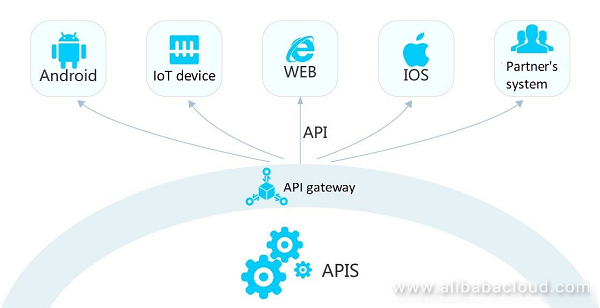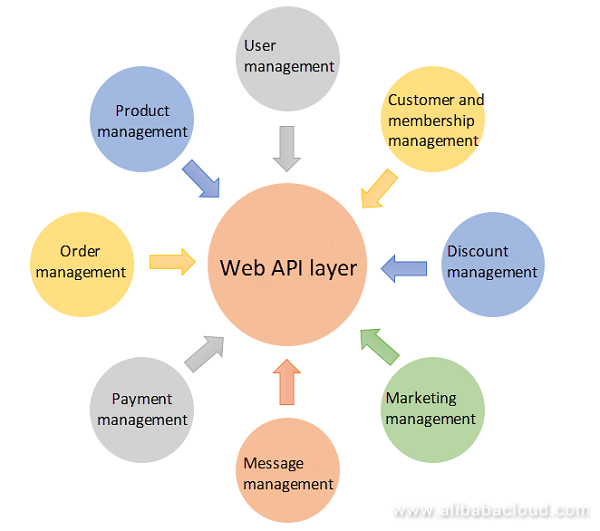Organizations can make innovative applications without reinventing the wheel by leveraging various APIs and SDKs, such as the API and SDK resources provided by Alibaba Cloud. In this article, we will explore how software development processes can benefit by using web APIs.
In the Internet era, networks are like computers. Therefore, software development needs to focus on the big picture to leverage resources and characteristics of the Internet. For example, to improve response performance, you can use a CDN as the front-end cache. In addition, you may also need to program with the CDN’s API to optimize the schedule of your caching resources. There are abundant web resources like this that you can put to good use. Developers need to take all of them into account for taking connectivity to the core of software development. Only software developed in this way has the ability to leverage Internet’s true power.
Cloud computing integrates a wealth of resources by using virtualization technology, enabling continuous extraction of software development ideas in higher dimensions. From virtual machines to clusters, to containers, and then abstract function computation, software development increasingly focusses on the core of the business. Such evolution is bound to improve efficiency. You can use various APIs to manage resources for the software development in cloud computing environments.

Some data is of great practical use, such as in weather forecasting. You can leverage such valuable data with the web API as an open interface. For instance, most service providers connect their taxi-hailing apps to a weather forecast API. In this way, drivers get notification of weather changes in advance, so that they can prepare for emergency cases. With the weather forecast data, the service providers can also exercise variable pricing to motivate drivers and provide passengers with better services. Everyone benefits during this process.
Another major role of web API is to serve as an open interface for complex computing. Generally, when a sophisticated and generic technical solution for web presentation of documents is lacking, especially on the mobile end, some applications involuntarily turn to workarounds. This explains why Alibaba DingTalk converts document pages into pictures, some mailboxes discard the outline fonts in documents, and instant messaging apps require users to download documents and view them in a third-party application.
However, one can resolve this issue by calling a document conversion web APIs, such as those available on 9yuntu. 9yuntu Web API converts all kinds of documents into the HTML5 format, including SVG. Fonts and typography remain unchanged and users can smoothly zoom in and out the document, even if the font library is lacking on the mobile end. Web APIs are the most suitable option for opening up an interface for such complex computing.
As we mentioned earlier, software running in the cloud computing environment inevitably uses various APIs for resource management. As a part of cloud computing infrastructure, web API is indispensable. By calling web APIs, developers integrate software products with the cloud computing system in an efficient and convenient way.
A set of complete APIs needs a uniform architecture. However, such architecture keeps evolving at all stages of API development. At early stages, to meet the scientific computing requirements, developers use calculation functions in some mainstream development languages. Although the API system is not complex at that time, as a part of the programming language, the API system is extremely explicit in regard to general uniformity. Developers are very clear about which functions to use.
With the development of IT, development interfaces become more powerful and keep emerging, such as controls, class libraries, and frameworks, and each solution forms its own system. Although third-party resources are continuously get added to the systems, the overall architecture still depends on core functionality. For example, Java JDK provides a large number of native class libraries. Despite the diversity of third-party products, the uniformity of the JDK architecture is always explicit due to the platform attributes of Java and the comprehensive core API functionality.
To maintain the uniformity of API architecture, we also need theoretical support. For example, all GUI model designs conform to fundamental theories. This ensures that developers are uniform in thinking when using different tools. For example, a developer with Windows GUI development experience can feel comfortable performing Java Swing development.
Currently, web APIs still have poor uniformity in architecture. Both the theoretical basis and fundamental framework are lacking. Even resource interfaces provided by the same cloud vendor do not have a reasonable classification architecture. It is somewhat difficult for developers to understand these web APIs. In a reasonably planned architecture with the cloud computing resources as a backbone, all third-party APIs can find the right places. This gives developers the confidence to use web APIs.
Like conventional APIs, web APIs of a complete architecture also need uniform interface specifications. Explicit standards can improve both communication efficiency and application efficiency for developers.
As mentioned before, networks are like computers. All resources of the Internet and cloud computing need to work in collaboration. Web APIs should provide subscription, listening, events, and other mechanisms to unify the interaction between all types of resources. In that case, resources are mutually associated in the entire API system to form a collaboratively operating unity, instead of a mass of scattered components.
The biggest difference of web APIs from conventional APIs is that web APIs have incredibly high-security requirements. The openness of the Internet poses great risks to network resources and services. This is the issue that Web APIs must address. Cloud vendors and third-party Web API developers have established encryption and authentication mechanisms. However, most of their implementation is distributed. Some provide unified access control, such as the RAM provided by Alibaba Cloud. However, the degree, intensity, transparency, and abstraction of uniformity in security assurance seem far from enough for the Web APIs. It is undoubtedly necessary to depend on a centralized security assurance mechanism. However, one should also consider technologies like blockchain to supplement the security mechanism.
The transaction volume in Alibaba Cloud API market indicates lack of collaboration in software development. This is due to the late start and inadequate maturity of the software industry. By contrast, in some highly developed industries, such as the automobile manufacturing industry, technical collaboration is universal and a large number of companies are collaboratively producing machine parts. To achieve mass collaboration, the software industry needs to have at least the following two conditions:
An ecosystem needs sound infrastructure to flourish. Infrastructure for Web APIs includes data, network resources, and architecture. With the development and prevalence of cloud computing, data and network resources are ready. The only urgent task now is to establish a uniform architecture. To build a flourishing Web API ecosystem, such architecture needs the complete and substantial backbone support from companies that are large and powerful enough to invest resources and undertake the leading responsibilities.
There are a couple of requirements for breaking new ground for technical collaboration in the software industry. One is formulating some technical standards, and the other is issuing qualification certificates. The government and different industries together accomplish these two tasks. The reliability of technical collaboration is ensured by the government's indirect role as guarantor when it formulates standards and issues licenses. However, when it comes to technical collaboration in the software industry, the government's hands are tied. Therefore, the industry calls for competent enterprises to take the two responsibilities. First, formulate technical standards for Web API products. This includes defining the types of interface, categories of a parameter, naming rules, and response times for the document format conversion Web APIs. Second, issue qualification certificates to Web APIs that meet the standards, and perform a routine audit on certified products to ensure stable operation and highly reliable services for users.
As a team who has participated in the Alibaba Cloud API application innovation contest twice, 9yuntu, has years of experience and technological know-how in document conversion, processing, cloud storage, and development of Web presentations.“9yuntu document format conversion API" is now available on the Alibaba Cloud API market. As a pioneer in the Web API field, 9yuntu has taken the first step in Web API development.
In this year's contest, 9yuntu provides a tourist product poster auto-generation system that automatically generates a poster with the HTML5 QR code by parsing the text in itinerary documents uploaded by travel agency users. This product incorporates an array of APIs, including 9yuntu document-to-HTML5 API, Alibaba Cloud NLP API, Alibaba Cloud OCR API, Alibaba Cloud face recognition API, Baidu picture API, Alibaba Cloud function calculation, and OSS API.

Web APIs have penetrated into all parts of our life, travel, and work and are essential to every significant trend in the IT industry. All applications of mobile devices, cloud computing, Internet of Things, big data, and social networking depend on web-based interfaces to connect to their distributed components and provide innovative and revolutionary solutions for all business sectors in the world. Web APIs are not only a catalyst but also the main force that drives achievements in these areas.
Find similar articles and learn more about Alibaba Cloud’s products and solutions at www.alibabacloud.com/blog.

2,593 posts | 793 followers
FollowAlibaba Clouder - May 17, 2021
Alibaba Clouder - May 6, 2019
Alibaba Clouder - December 22, 2020
Alibaba Clouder - July 24, 2018
Data Geek - May 9, 2023
Alibaba Developer - May 8, 2019

2,593 posts | 793 followers
Follow ECS(Elastic Compute Service)
ECS(Elastic Compute Service)
Elastic and secure virtual cloud servers to cater all your cloud hosting needs.
Learn More OSS(Object Storage Service)
OSS(Object Storage Service)
An encrypted and secure cloud storage service which stores, processes and accesses massive amounts of data from anywhere in the world
Learn MoreLearn More
More Posts by Alibaba Clouder